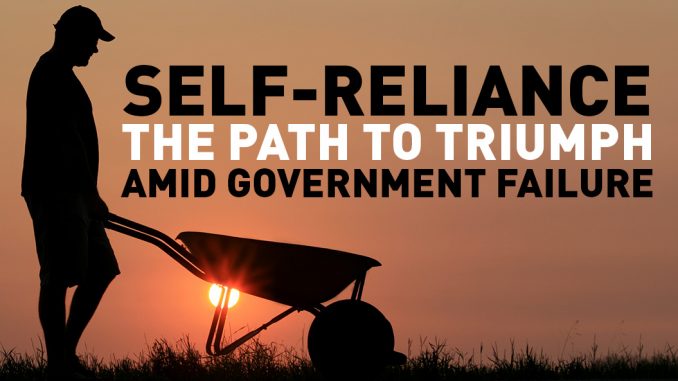
In a statement to news media just before Christmas, FEMA administrator Brock Long urged all Americans to understand three truths:
- FEMA is broke.
- The system is broken.
- If this is the new normal, Americans can’t rely on a federal cavalry when disaster strikes. They will have to take care of themselves.
Administrator Long’s first two points deserve some rigorous analysis – something we’ll be watching as it unfolds. His third and most important point is something we should all act on now. (See source of the quote.)
We’ve known that we can’t count on the government to provide for all in a crisis. It’s happened time and time again, affecting nearly every region of our country. For decades.
I certainly don’t fault newly-minted Administrator Long for FEMA’s failure. In fact, I hope his message moves many to prepare who haven’t. It should be crystal clear now – we must take care of ourselves.
That’s why we also want to make clear one fundamental truth in response to Long’s warning:
SELF-RELIANCE IS THE ONLY WAY FORWARD
Let this truth be our mantra this year as we spread the message of our lifestyle to family and friends. Remember – we are only as strong as the least-prepared person we know and love.
If FEMA’s warning is not enough for those on the fence, how should we convince them?
This is complicated, but I advocate a positive approach.
We know that federal emergency management is broken because of lumbering bureaucracy, intensifying frequency and magnitude of disasters, communication issues, lack of funding, mismanagement – and the list continues…
But focusing on the results of our vigilance are not as persuasive to preparedness newcomers. The benefits of our preps and steps toward self-reliance, however, can make the convincing simple.

For example, stocking up on emergency food with a 25-year shelf life is an investment with incredible value.
Its monetary value is a hedge against always rising food prices and potential shortages.
Its tangible value, seeing you through a crisis, has no price tag.
Plus, if you reach the end of your emergency food’s long shelf life without having to use it, you can enjoy it and it will taste as good as the day it was sealed.
Similarly, growing your own food has tremendous value.
An average 600 square foot garden can grow $1000 or more in produce at market prices.
You get the best in taste and nutrition as your food goes direct from yard-to-table.
Growing food and storing heirloom seed is also the only true solution for long-term emergencies. Without this strategy, any stored food will eventually run out.
Plus, if you grow from 100% heirloom seeds, you can harvest the seeds for re-planting endlessly. This can reduce or eliminate the need to buy new seeds.
These are two quick examples, but it can be applied pretty much across the board for all self-reliant skills and preparedness.
Once you can show the true value and benefit of preparedness, it’s a lot easier to take those first few steps.
Then, vigilance comes naturally because you want to be ready to put your plans in action ASAP when needed.
For those of us who are already deeply committed to preparedness, what should we make of Long’s revelation?
Beyond spreading the message of personal preparedness and self-reliance far and wide, and building out our own plans, there is one thing that remains.
Can you guess?
It’s that vigilance. We need to stay as informed as possible throughout these other activities.
Whenever something big that affects preparedness hits the headlines, one of my first questions is: What do they know that I don’t?
 Long’s statement about FEMA’s shortcomings was made in the wake of one of the most devastating hurricane, widlfire and flooding seasons in recent memory. But I’m assuming he intended his admission of failure to cover all response to natural disasters.
Long’s statement about FEMA’s shortcomings was made in the wake of one of the most devastating hurricane, widlfire and flooding seasons in recent memory. But I’m assuming he intended his admission of failure to cover all response to natural disasters.
What else is the federal government not prepared to handle?
Many of my friends and fellow preppers believe that our weakness in emergency response could be exploited. Those trying to do us harm could take advantage to launch attacks – cyber, military, terrorist, biological – and inflict major damage.
I sincerely hope that never happens. But history teaches us otherwise. The thought experiment illustrates the urgent need for us to ramp up our self-reliance efforts and vigilance this year.
I encourage you to take stock and inventory of your preps. Consider what would make a difference if the worst happened. Then take steps to increase and build out your plans. You may need to account for other relatives, friends and neighbors with your preparations who will turn to depend on you if a crisis strikes.
[adrotate banner=”24″]

[pt_view id=”517b65fj16″]
Widget not in any sidebars




Be the first to comment